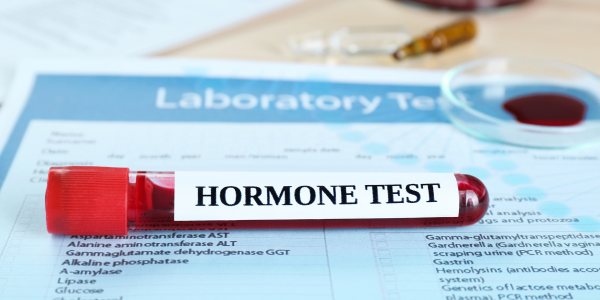

Everyone gets tired sometimes. Many people forget things, and need to write everything down on post-its. That’s normal, right?
Not when you’re tired all the time.
Do you also struggle with:
- Mood swings, depression, or anxiety?
- Unexplained weight loss or gain?
- Diarrhea or constipation?
- Loss of sex drive?
- Missed periods or a heavier flow?
- Constantly fighting over the thermostat, because you feel so much colder or warmer than other people?
- Dry skin – or reddish tough skin on your legs?
- Fluid retention?
- Thinning hair?
- Aches and pains
If so, you may have an undiagnosed thyroid autoimmune disease.
Autoimmune disease can be sneaky at times, so don’t feel bad that you’ve not realized until now. Your thyroid is a powerhouse, the unsung hero of your endocrine system. So when it goes wrong, the results can be profound. But in the beginning, the symptoms are subtle – and easy to ignore. It’s time to pay attention to what your body is telling you.
What Does My Thyroid Do?
Your thyroid gland is a part of your endocrine system: a butterfly-shaped organ that hugs your windpipe, just below your Adam’s apple. It has a vital job in producing, storing, and releasing hormones that regulate a number of bodily functions – by maintaining your metabolism. Your brain signals for the release of these hormones through the pituitary gland releasing thyroid-stimulating hormone (TSH).
Your thyroid uses iodine and amino acids to create triiodothyronine (T3) and thyroxine (T4).
Together, these hormones regulate a great many of the processes carried out in your body – even on a cellular level, as they are responsible for triggering the conversion of oxygen and nutrients into energy. As such, they play an important role in maintaining your:
- Breathing and heart rate
- Nervous system function and brain function
- Body temperature
- Blood cholesterol levels
- Fat storage
- Menstruation cycle
- Muscle strength and regeneration
Unfortunately, your thyroid is as susceptible as the rest of your body when it comes to inflammation. And because it’s responsible for so many essential processes, chronic inflammation and autoimmune disease of the thyroid can have a huge effect on your general health.
What is Hashimoto’s Disease?
Hashimoto’s disease or Hashimoto’s thyroiditis, is the most common autoimmune disease that affects the thyroid. It occurs when immune cells flood your thyroid and begin to attack the gland’s tissues, cells, and blood vessels – eating it from within. Hashimoto’s often progresses into hypothyroidism – where your thyroid begins to create less thyroid hormones, impacting many of your body’s functions.
The effect of the disease is subtle at first. Sometimes you may have a swelling in the neck area – this is a goiter, which can be caused by inflammation.
Symptoms of Hashimoto’s include:
- Fatigue
- Constipation
- Weight gain
- Muscle aches and stiffness
- Forgetfulness
- Dry skin and brittle nails
- Sensitivity to cold
- Muscle weakness
- Depression
- A longer or heavier menstrual period
- Decreased libido
- Pale or puffy face
You are at higher risk of developing Hashimoto’s if you:
- Are female
- Are middle-aged
- Family history of a thyroid or autoimmune disease
- Already have another autoimmune disease
- Have been exposed to high levels of radiation or other toxins
If you suspect you have Hashimoto’s, it’s important you see your functional healthcare provider and seek a diagnosis as soon as possible so that you can receive the right treatment and find ways to reduce your symptoms.
How is Hashimoto’s Diagnosed?
Your doctor can diagnose Hashimoto’s using the following methods:
- Physical exam: After discussing your symptoms, your doctor may want to examine your neck, joints, skin, thyroid gland, and check if your face is pale and puffy.
- Blood tests: Your doctor should order the following labs:
- TSH: To check if your levels of TSH are high. This occurs with Hashimoto’s as your brain registers that not enough T3 and T4 is in your bloodstream, so the pituitary gland increases TSH to try and trigger your thyroid into making more.
- T3 and T4 (total and free): Lower levels of the thyroid hormones can indicate if hypothyroidism has begun to present.
- Reverse T3: to assess proper conversion of T4 to T3.
- TPO antibodies: These work against an enzyme called thyroid peroxidase which is used to create T3 and T4. However, these antibodies aren’t always present in Hashimoto’s.
- Thyroglobulin antibodies: These antibodies can be high in either Hashimoto’s or Grave’s disease. There are many patients that have elevations in both.
- Other advanced tests to look for the root causes/triggers of Hashimoto’s.
- Thyroid Ultrasound: may indicate presence of autoimmune thyroiditis. And will also check for the presence of masses, nodules and cysts.
In the case of thyroid hormone deficiency, treatment involves use of thyroid hormones. But if you spot Hashimoto’s before it develops into hypothyroidism there are lifestyle changes you can use to slow the progression of the disease and potentially avoid the need for thyroid hormone replacement.
What is Graves’ Disease?
Graves’ disease is another autoimmune disease where your immune system mistakenly attacks your thyroid. But instead of triggering hypothyroidism, where your thyroid makes fewer hormones, it results in your thyroid creating too much T3 and T4! In this case, the thyrotropin receptor antibody (TRAb) attaches to the receptor for TSH, causing your thyroid to create more and more hormones. There can also be thyroid stimulating immunoglobulins as well. Graves’ disease is a form of hyperthyroidism – where the thyroid works too hard.
Because thyroid hormones have such a huge responsibility, the symptoms of Graves’ disease are wide-ranging, and just as disruptive as those of Hashimoto’s and hypothyroidism.
Graves’ disease symptoms include:
- Unexplained weight loss
- Fatigue
- Anxiety
- A slight tremor in your hands or fingers
- Menstruation cycle changes
- Sensitivity to heat, including increased perspiration
- Goiter (enlarged thyroid gland)
- Frequently needing to empty bowels
- Decreased libido
- Rapid or irregular heartbeat
- Insomnia
- Graves’ dermopathy – a thick red layer of skin found on shins or top of the feet
- Graves’ ophthalmopathy – causing bulging eyes, retracting upper eyelids, redness, grittiness, and sometimes pain. The condition can lead to vision loss if left untreated.
You are at higher risk of developing Graves’ disease if you:
- Are under forty
- Have a family history of Graves’ disease
- Are female
- Already have another autoimmune disease
- Are pregnant or have recently given birth, and have a family history of the disease
- Smoke
- Are under a lot of stress, and have a family history of the disease
Graves’ disease can affect your sight, cause serious issues during pregnancy, and cause brittle bones and heart disorders if left untreated. Rarely it can cause accelerated hyperthyroidism, which requires urgent emergency care. So if you suspect you may have Graves’ disease, do not hesitate to consult your doctor for a diagnosis.
How is Graves’ Disease Diagnosed?
Your doctor can diagnose Graves’ disease using the following methods:
- Physical exam: After discussing your symptoms, your doctor can examine your eyes for signs of Graves’ ophthalmopathy, look for signs of Graves’ dermopathy, and check for a goiter in your neck.
- Blood test: The following labs are helpful in the diagnosis of Graves’:
- TSH and thyroid hormones: To check if your levels of TSH are low. In the case of Graves’ disease, your levels of TSH are lower than normal because your brain can detect the high levels of T3 and T4, and won’t want to signal to make more.
- T3 and T4: Very high levels of your thyroid hormones are present when you have Graves’ disease.
- TRAb: The antibody that binds to your receptor and triggers the release of T3 and T4. Thyroid stimulating immunoglobulins may also be present, as well as thyroglobulin antibodies and TSH receptor antibodies (another name for TRAb). High levels indicate Graves’ disease – if it isn’t present in high amounts then you may have another type of hyperthyroidism.
- Radioactive iodine uptake (RAIU): Iodine is crucial for your thyroid to make T3 and T4. You take a small amount of radioactive iodine, and your doctor uses a special probe to see the rate at which your thyroid absorbs it, in order to determine what form of hyperthyroidism you have.
- Imaging tests:
- Ultrasound: A useful alternative to RAIU, if you can’t be exposed to radiation in the case of pregnancy. It can show if your thyroid is enlarged and also look for masses, nodules, and cysts.
If you are diagnosed with Graves’ disease, you may be offered a range of treatments depending on the severity of your disease. These include medication to suppress thyroid function, radioactive iodine therapy, or surgery. Treatments for Graves’ ophthalmopathy include steroids, orbital decompression surgery, and specialized glasses to help correct double vision. However, there are also some lifestyle changes you can make to slow the progression of Graves’ disease.
How Can I Manage My Thyroid Autoimmune Disease Long-Term?
Autoimmune disease occurs wherever there is inflammation. In the case of both Hashimoto’s and Graves’ disease, inflammation creates the overactivity of immune cells, leading to a large number of symptoms.
The good news is that it’s possible to recover your health by reducing the underlying inflammation. Wouldn’t it be great to actually tackle the root cause, and not just focus on treatments that only deal with the symptoms! A functional medicine doctor can work with you to come up with a plan.
We can help you in tackling the underlying causes of Graves’ disease or Hashimoto’s disease – and give you advice on handling your thyroid autoimmune disease. If you’re interested in checking out functional medicine in the Phoenix, Scottsdale, Paradise Valley, Arizona area, call to book an appointment at 602 892-4727 or fill out our contact form. If you’re not local to us, why not try 7 Weeks to Your Healthiest Self – our masterclass that provides you with the lifestyle change benefits of functional medicine – from the comfort and privacy of your own home.
Share:
Social Media
Most Popular Posts
Subscribe To Our Newsletter
Related Posts

New Podcast Episode: My journey into functional medicine + what I’ve learned
I’m excited to share that I recently joined DeLo for Episode 165 of the On the DeLo podcast! In this conversation, we explored my journey

Understanding the Essential Labs for Women on Hormone Replacement Therapy (HRT)
So what are the minimum labs we’re looking at when we do hormone replacement therapy? We obviously want to look at an estrogen level, so

How to figure out the right amount of HRT in women
What about checking lab values when you’re on hormone replacement therapy? I do find it to be helpful, but we also want to consider symptoms.

Did you know there’s a difference between food allergies, sensitivities, and intolerances?
Did you know that there’s a difference between food allergies, food sensitivities and food intolerances? Food allergies, the reactions tend to happen pretty immediately and
